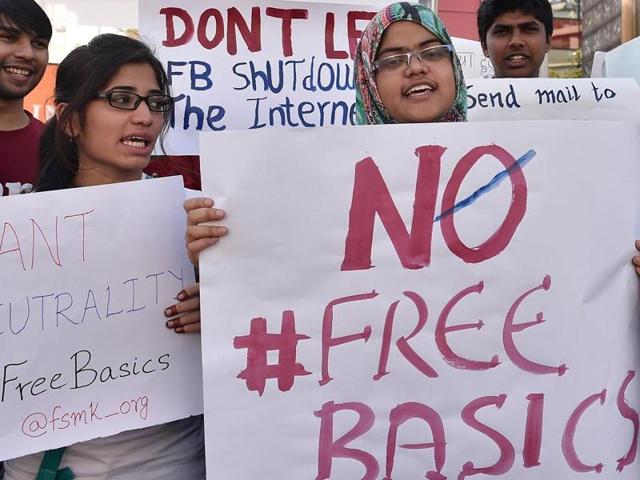How Zuckerberg’s Free Basics lost to net neutrality in India
On Monday afternoon, Mumbai-based entrepreneur Mahesh Murthy wrote on his Facebook Timeline — “On differential pricing and Facebook Free Basics or Airtel Zero....They’re all banned! We won!”
On Monday afternoon, Mumbai-based techprenuer, Mahesh Murthy wrote on his Facebook Timeline, “On differential pricing and Facebook Free Basics or Airtel Zero....They’re all banned! We won!”

It was a message many among Murthy’s 24,000-odd followers were waiting to read. Just minutes before Murthy announced victory, Telecom Regulatory Authority of India (TRAI) had said that differential pricing for accessing content on the internet or what the opponents of it call the absence of Net Neutrality will be treated as illegal and attract a fine up to Rs 50 lakh if violated.
Read: TRAI says no to Facebook’s Free Basics, supports net neutrality
The last few months preceding TRAI’s Monday verdict, Murthy and a small group of like minded individuals had turned crusaders, hell bent on stopping Facebook Founder CEO Mark Zuckerberg’s unabashed and persistent move to bring Free Basics to India. For the $18 billion social media giant based in Silicon Valley, the stakes were too high -- enough to have reportedly spent Rs 200-300 crore on a media campaign in India in the last week of December 2015. With less than a fourth of Indians having access to the Internet, the scope to monetize content on the Net was the proverbial pot of gold Facebook found and quite likely still finds irresistible.
Murthy said a small group of ‘rag-tag’ professionals put their heads together and decided to give Facebook a fight. “It was the right thing to do. Personally I had no commercial axe to grind here. What Zuckerberg was trying to do was completely wrong. We were just a bunch of guys, some of us have not even met each other, but got organized on Slack and strategized our move,” Murthy told HT. Slack is a cloud-based teamwork application, quite popular among the technologically savvy professionals. This group had professionals with background in law, technology, media etc.
Watch | Decoding the TRAI ruling in favour of net neutrality
Kiran Jonnalagadda along with Nikhil Pahwa, Founder and Publisher of MediaNama created a parallel movement under Savetheinternet banner. Jonnalagadda, co-founder of HasGeek said for the year or so he had to take a break from work to defend Net Neutrality. “It was important, else it was going to affect our business in the long run anyway,” he said.
The road to victory did come with a price for Murthy as well. For starters, he says his good friend Kirthiga Reddy, managing director of Facebook in India slipped off his network. “Our children go to the same school in Mumbai. We live around the same area in Mumbai. But I think it will be ok,” he said hoping his friendship with Reddy will be restored when the storm over Free Basics subsides. Interestingly Murthy has three times more followers on Facebook than Reddy.
“In the midst of the campaign, my WhatsApp account was disconnected for lifetime. I was later told it happened inadvertently and restored.” WhatsApp is the messenger service provider Facebook had bought for $19 billion in 2014 and has over a billion users worldwide now. Murthy says he was also among five people in India whose views on Free Basics was collated regularly and sent to Facebook headquarters.
Zuckerberg and his team in Silicon Valley were listening, but were not willing to change their stance on Free Basics said Jonnalagadda. “They were only interested in knowing why we were opposing Free Basics, but did little to change it,” he adds.
Bengaluru-based Vaitheeswaran Kothandaraman, co-founder of Fabmall (acquired by Aditya Birla group and re-branded More), got involved when Free Basics was still Internet.org. “The great thing is we were not working together but for a common good. That was the most interesting part of it.”
Kothandaraman believes that Free Basics was a communications disaster right from the start. “Just because they could have the Prime Minister visit their headquarters (town hall meeting) does not mean that the people in India could be pushed around. In that sense what TRAI has done is truly impressive.” For many like Kothandaraman, Facebook’s media campaign proved to be the proverbial last straw on the camel’s back. “That got me personally annoyed. I even Tweeted ASCI (Advertising Standards Council of India) to ask Facebook to explain the media miscommunication they were pushing,” he said.
The campaign against Free Basics also found support from Vijay Shekhar Sharma, founder and chief executive of India’s largest digital wallet company Paytm and Nandan Nilekani, former Infosys CEO and first chairman of Unique Identification Authority of India (Aadhar). Sharma asked fellow Indians to either choose Free Basics and do a jihad for independent internet later or pick net neutrality while Nilekani called it a ‘walled garden’ that is against the spirit of openness on the internet.
For many like Jonnalagadda and Chennai-based Vijay Anand who runs The Startup Centre, the fight was not exactly against Free Basics, but differential pricing. “In a debate with the Cellular Operators Association of India, I asked if differential pricing is akin to ‘hafta’ that startups and developers have to pay the operators now.’
Most agree this is only battle won, not the war. Murthy believes Facebook will come back with the best lawyers to fight out their case. “Facebook has done a laudable job in India. I still recommend it to my clients. But with Free Basics they overstepped with a bad product and bad communication.”
On Monday Kothandaraman wrote on his Facebook with a dash of humor, “Let’s stay vigilant though. Old wine may return in new bottle branded #FreeBull.”
Read: Father of internet congratulates India for strong net neutrality rules
Trai played with a straight bat, stood up for net neutrality





